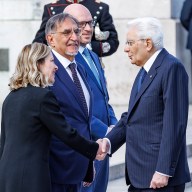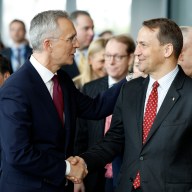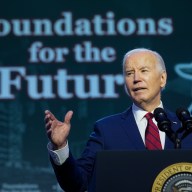By Rania El Gamal, Alex Lawler and Olesya Astakhova
VIENNA (Reuters) – Saudi Arabia and other OPEC members were seeking to win support from Russia on Wednesday to join them in additional oil output cuts in a bid to prop up prices which have tumbled by a fifth this year because of the coronavirus outbreak.
Two OPEC sources told Reuters talks were focussing on an additional cut in excess of 1 million barrels per day (bpd) on top of existing curbs agreed by OPEC and its allies since January. Russia has been resisting the extra measure.
“OPEC hopes for a cut bigger than 1 million but the challenge is still Russia,” another OPEC source said.
A panel of several representatives from OPEC states, Russia and other producers recommended on Tuesday cutting output by 600,000 to 1 million bpd only in the second quarter and said existing cuts of 2.1 million bpd by the group known as OPEC+ should be extended to the end of 2020.
Russia has indicated that it backed an extension, but the two OPEC sources said Moscow was reluctant to agree to deeper cuts even after talks on Wednesday between Saudi Energy Minister Prince Abdulaziz bin Salman and Russia’s Alexander Novak.
The Saudi and Russian ministers have made no public statements so far since arriving to Vienna.
The talks in Vienna were following a familiar pattern to previous meetings. In the past, Moscow had initially been hesitant before ultimately agreeing to joint cuts with OPEC.
Ministers of the Organization of the Petroleum Exporting Countries hold their formal meeting on Thursday, followed by a meeting of the broader OPEC+ group including Russia on Friday.
Moscow has said it is worried by the rise of shale oil in the United States, which is not part of OPEC. U.S. producers have boosted output at the expense of the group.
‘DOWNWARD REVISIONS’
Wednesday’s meeting involved the Joint Ministerial Monitoring Committee (JMMC), comprising a handful of OPEC and non-OPEC ministers. The meeting, part of preparations for the broader ministerial talks, had lasted nearly four hours by 1630 GMT.
Sources had told Reuters earlier this month that OPEC could agree deeper cuts even without Russia.
But two OPEC sources said Riyadh did not want to carry most of the burden of cuts alone and was pressing Moscow to join in with a proper contribution. Another source had said Moscow was trying to keep to a minimum any extra cut that it agreed to.
“Cuts will need to at least be towards the top end of the range, as we see further downward revisions in demand growth as Covid-19 spreads,” Warren Patterson from ING said in a note.
Existing cuts have not been enough to counter the impact of the new coronavirus on China, the world’s biggest oil importer, and on the global economy. Factories have been disrupted, fewer people are travelling and other business has slowed, driving down oil demand.
“Whatever action OPEC ultimately takes seems unlikely to produce the desired effect of rebalancing the market and substantially raising prices. Rather, the strategy today may be one of attempting to stem further bloodletting and hope demand recovery can be achieved later in the year,” analysts from the Center for Strategic and International Studies said in a report.
Benchmark Brent oil prices slipped below $52 a barrel
(Additional reporting by Shadia Nasralla and Ahmad Ghaddar; Writing by Dmitry Zhdannikov; Editing by Edmund Blair)















